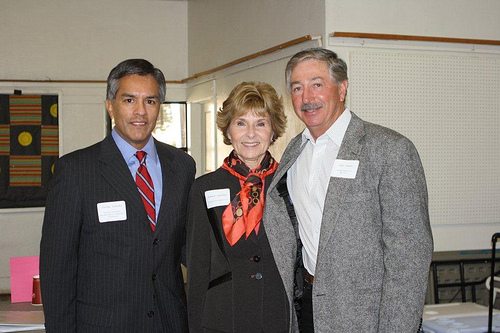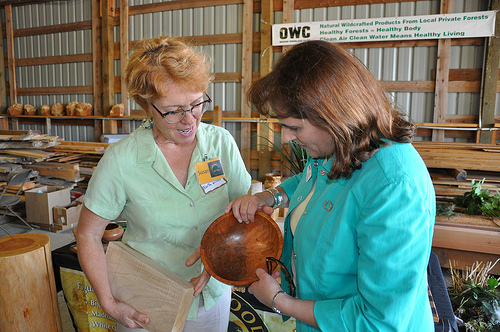
Deputy Thomas Guevara, Deputy Assistant Secretary for Regional Affairs at the Economic Development Administration (left); Colorado Agriculture Commissioner John Salazar (right), and Colleen Callahan of USDA prepare for the morning session at the drought conference. USDA photo.
Over 100 attendees joined Thomas Guevara, Deputy Assistant Secretary for Regional Affairs at the US Department of Commerce Economic Development Administration and Colorado Agricultural Commissioner John Salazar at the second of four regional workshops to outline resources available to assist with drought recovery efforts. The Colorado regional workshop was held at the state fairgrounds in Pueblo earlier this week. The U.S. Department of Agriculture (USDA) is partnering with tribes, local, state and federal partners to hold the workshops. Federal partners include the Department of Commerce, the Small Business Administration, and the Federal Emergency Management Agency.
With over two-thirds of the country in drought, recovery efforts are underway and a new framework for delivery is being developed. Collaboration, coordination and communication were the prevalent themes at the Colorado workshop. These efforts will be needed at all levels of government and our ability to work together is crucial. Read more »
Tags: Arkansas, Colorado, Department of Commerce, Department of Transportation, drought, FEMA, Ohio, President Obama, Small Business Administration, Thomas Guevara, White House
 Environment
Environment

Susan Curington of North Woods Figured Wood (left) shows State Director Vicki Walker (right) how the family business “upcycles” burls, stumps and small, odd-shaped, or difficult-to-use wood pieces to be sold at premium prices to carvers and other hobbyists. USDA photo.
At a recent expo held by the Oregon Woodland Cooperative (OWC), I had the opportunity to meet with a number of family forest landowners who are cultivating additional commercial ventures thanks, in part, to USDA’s Value Added Producer Grant (VAPG) program.
At the event, OWC President Neil Schroeder introduced me to cooperative members who have sprouted new businesses and created local jobs as a result. The terrific part of all this is that USDA’s VAPG program provided funds needed to conduct the in-field assessments, feasibility studies, business planning, and marketing activities needed to identify, process and sell new, non-lumber products harvested from Oregon’s family forests. Read more »
As producers face an historic and ongoing drought today, President Obama and I are doing all we can to help farmers and ranchers mitigate its effects – while helping communities to overcome the economic challenges posed by the drought.
To carry out our work on behalf of communities and producers, USDA has relied on programs authorized by the 2008 Farm Bill. Parts of that law, including authorization of USDA disaster assistance for livestock producers, expired last year. Other aspects of the law expire on October 1st and over the next few months if Congress fails to act. Read more »
You may have heard this year’s back to school season is a little different than in past years. There is a new, healthier look for the school lunch menu. These updates represent the first major changes to school meals in 15 years, and we know that these changes come with questions. We’ve promised to keep the dialogue open, and we are working to ensure that we answer them all.
The vast majority of students, parents, teachers and school service professionals have had great positive feedback on the new, healthier lunches. However, a few parents have expressed concerns that kids will come home from school hungry or not get enough to eat during the day because their kids have higher caloric needs – in particular, kids who are athletes. Schools and families have – and have always had – multiple options for addressing their needs. Read more »
“Food isn’t traditionally thought of as a diplomatic tool, but sharing a meal can help people transcend boundaries and build bridges in a way that nothing else can.”
Secretary of State Hillary Rodham Clinton
Some of the nation’s top chefs have signed on to help promote American food and culinary traditions around the world through the new American Chef Corps. The corps is part of the Diplomatic Culinary Partnership Initiative, launched earlier this month by the Department of State and the James Beard Foundation. USDA is delighted to support this initiative, which is an excellent complement to our ongoing work highlighting the quality, variety, safety and sustainability of U.S. food products to our customers around the world. Read more »
In an effort to advance food and agricultural research that enables farmers and ranchers to meet the growing global demand for food, U.S. Department of Agriculture’s (USDA) Chief Scientist Catherine Woteki will lead the U.S. Government’s delegation to the first-ever Meeting of Agricultural Chief Scientists (MACS) in Guadalajara, Mexico this week. Member countries committed to the meeting earlier this year at the June 2012 G-20 Leaders Summit, as a step to gain greater efficiency and utility from global agricultural research investments. The meeting is being convened by the Mexican government as part of their role heading the Group of Twenty (G-20) this year.
“Over the next 50 years, we will need to produce as much food for the world’s population as has been produced in the entire history of mankind,” said Woteki, who is also USDA’s Under Secretary for Research, Education and Economics. “A challenge this serious and urgent requires bringing together the best minds in food and agricultural science to chart our course on research. This meeting is the first of its kind, and I believe it is the beginning of a collaboration that will benefit scientists, farmers, and citizens around the world.” Read more »


